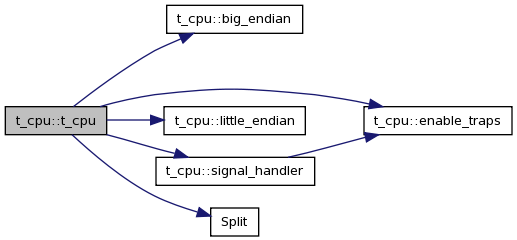
#include <cpu.h>
Collaboration diagram for t_cpu:

Public Member Functions | |
| t_cpu () | |
| bool | big_endian () const |
| bool | little_endian () const |
| void | setAssertAbort (bool val) |
| bool | lgAssertAbort () const |
| long | nCPU () const |
| const char * | host_name () const |
| void | printDataPath () const |
Private Member Functions | |
| void | enable_traps () const |
Static Private Member Functions | |
| static void | signal_handler (int sig) |
Private Attributes | |
| union { | |
| char c [4] | |
| int32 i | |
| } | endian |
| int32 | Float_SNaN_Value |
| int32 | Double_SNaN_Value [2] |
| bool | p_lgAssertAbort |
| long | n_avail_CPU |
| char | HostName [STDLEN] |
| vector< string > | chSearchPath |
| int | nFileDone |
Friends | |
| FILE * | open_data (const char *fname, const char *mode, access_scheme scheme) |
| void | set_NaN (sys_float &x) |
| void | set_NaN (sys_float x[], long n) |
| void | set_NaN (double &x) |
| void | set_NaN (double x[], long n) |
Definition at line 146 of file cpu.h.
| t_cpu::t_cpu | ( | ) |
Definition at line 38 of file cpu.cpp.
References big_endian(), chSearchPath, CLOUDY_DATA_PATH, DEBUG_ENTRY, Double_SNaN_Value, enable_traps(), endian, Float_SNaN_Value, HostName, i, little_endian(), n_avail_CPU, nFileDone, p_lgAssertAbort, signal_handler(), Split(), SPM_RELAX, and STDLEN.
Here is the call graph for this function:

| bool t_cpu::big_endian | ( | ) | const [inline] |
| void t_cpu::enable_traps | ( | ) | const [private] |
| const char* t_cpu::host_name | ( | ) | const [inline] |
| bool t_cpu::lgAssertAbort | ( | ) | const [inline] |
| bool t_cpu::little_endian | ( | ) | const [inline] |
| long t_cpu::nCPU | ( | ) | const [inline] |
| void t_cpu::printDataPath | ( | ) | const |
Definition at line 431 of file cpu.cpp.
References chSearchPath, cpu, i, and ioQQQ.
Referenced by open_data(), and ParsePrint().
| void t_cpu::setAssertAbort | ( | bool | val | ) | [inline] |
Definition at line 192 of file cpu.h.
References p_lgAssertAbort, and signal_handler().
Referenced by main(), and ParseSet().
Here is the call graph for this function:

| void t_cpu::signal_handler | ( | int | sig | ) | [static, private] |
Definition at line 419 of file cpu.cpp.
References cpu, and enable_traps().
Referenced by setAssertAbort(), and t_cpu().
Here is the call graph for this function:

| FILE* open_data | ( | const char * | fname, | |
| const char * | mode, | |||
| access_scheme | scheme | |||
| ) | [friend] |
| void set_NaN | ( | sys_float & | x | ) | [friend] |
vector<string> t_cpu::chSearchPath [private] |
the default search path to the data files
Definition at line 176 of file cpu.h.
Referenced by open_data(), printDataPath(), and t_cpu().
int32 t_cpu::Double_SNaN_Value[2] [private] |
union { ... } t_cpu::endian [private] |
alias an int32 to 4 chars to test if we are on a big-endian or little-endian CPU the array cpu.endian.c[] is initialized in cdInit()
Referenced by big_endian(), little_endian(), and t_cpu().
int32 t_cpu::Float_SNaN_Value [private] |
char t_cpu::HostName[STDLEN] [private] |
the name of the computer, not detected on all systems
Definition at line 174 of file cpu.h.
Referenced by host_name(), and t_cpu().
int32 t_cpu::i [private] |
long t_cpu::n_avail_CPU [private] |
int t_cpu::nFileDone [private] |
bool t_cpu::p_lgAssertAbort [private] |
should a failed assert raise SIGABRT so that we can catch it in a debugger?
Definition at line 169 of file cpu.h.
Referenced by lgAssertAbort(), setAssertAbort(), and t_cpu().
 1.4.7
1.4.7